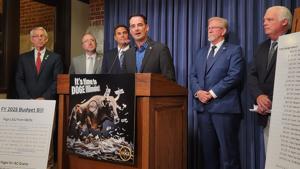(The Center Square) – Illinois Republicans say there is more than $1 billion of Illinois taxpayer funds going to non-government organizations with little oversight and accountability.
Among the spending some members of the Illinois House Republicans highlighted was more than $14 million going to the Indo American Center. State Rep. Brad Halbrook, R-Shelbyville, said that’s just a drop in the bucket.
“Today, we’re turning our attention to a staggering amount of taxpayer money, over $1 billion that’s been funneled into politically connected non-government organizations, or NGOs,” Halbrook said during a news conference in Springfield Tuesday.
State Rep. Chris Miller, R-Oakland, said hundreds of millions are going out to other nonprofits with little oversight for the taxpayers.
“When you start to trim the pork, the pigs start to squeal,” Miller said. “And that’s what we’re going to see when these things get exposed, the uproar is going to be deafening.”
Not on the Republicans’ list was more than $5.8 million going to the American Lung Association in fiscal year 2024. State Rep. Martin McLaughlin, R-Barrington Hills, said there needs to be more oversight.
“We need to have the ability to get into these agencies and have them respond and the current structure doesn’t allow us to,” McLaughlin said.
The group of Republicans also said their proposed budget, coming in at $11 billion less than Gov. J.B. Pritzker’s proposed budget, is more responsible for taxpayers.
Pritzker’s proposed budget is nearly $55 billion, the largest in state history. State Rep. Jed Davis, R-Yorkville, said their plan comes in much lower.
“I think there’s a clear path down to $44 billion that is not painstaking to the people of Illinois and also putting $1,500 back into the pockets of working families,” Davis said. “Again, we do not have a revenue problem. We have a priority problem.”
Details of the GOP plan are expected to be released Wednesday.
State Rep. Blaine Wilhour, R-Beecher City, said one place to cut is nearly a billion dollars for nonprofits.
“The easy answers were a long time ago,” Wilhour said. “It’s going to take tough people to come up here and rightsize this stuff.”
Legislators have until May 31 to pass a balanced budget with simple majorities. The next fiscal year begins July 1.





